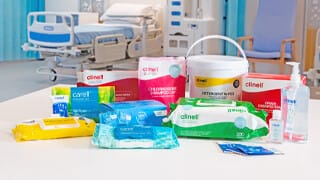Posted
26th February 2024
Products
In this blog, Dr Phil Norville discusses the momentum-gaining ‘Gloves Off’ campaign and highlights areas where healthcare workers can look to go gloves off during routine cleaning and disinfection.
Hand hygiene is a vital part of providing safe healthcare. And the use of non-sterile gloves are an important part of safe hand hygiene. However, there is a tendency for gloves to be over-used, and this introduces increases IPC risk, can make hand health issues worse, isn’t good for the environment because it generates plastic waste, and costs money!
Gloves are often used when undertaking environmental cleaning and disinfection, but this is an area where there are opportunities to go ‘gloves off’ and reduce plastic waste.
When to wear gloves?
The National Infection Prevention and Control Manual for England outlines the fairly narrow window of activities when gloves are required during health and care activities. These are:
- when exposure to blood and/or other body fluids, non-intact skin or mucous membranes is anticipated or likely
- for some aseptic procedures, such as when sterility is required in theatres or when inserting central lines
- when exposure to drugs or chemicals requires the use of gloves to protect the hands
Gloves on or off: transmission-based precautions
Even when undertaking contact transmission-based precautions for patients who are being isolated for a pathogen spread by the contact route (such as MRSA or CPE), universal gloving is not required, and gloves are only required when body fluid exposure is anticipated or likely (or for the other reasons outlined above). So, gloves are not required when touching the intact skin of a patient, even when they have a known pathogen spread by the contact route.
The general rule of thumb is that staff who are undertaking environmental cleaning and disinfection should wear the same level of PPE as staff undertaking clinical duties in the same area.
Overuse of gloves can cause consequences
It is recognised that gloves are often over-used in the clinical setting. The overuse of gloves results in the following consequences:
- Increased IPC risk. Gloves provide a false sense of security to staff, who feel protected and don’t then do hand hygiene when the gloves are removed. Also, gloves tend to be worn for too long, often beyond the duration of the immediate task for which they were selected. This can result in increase risk of transmission of pathogens that are spread via the contact route.
- Patient experience. Patients often feel uncomfortable with inappropriate use of gloves for personal tasks.
- Sustainability. Gloves increase the volume of plastic waste in health and care settings, and also are not free, so bring a financial burden too.
- Skin health. The use of gloves cause and exacerbate skin issues for staff.
The ‘Gloves Off’ campaign
In response to these issues linked to gloves, there is a “Gloves off” movement, which is rapidly gathering pace. The Royal College of Nursing (RCN) have taken a leading role in establishing the need to address over-use of gloves, which is a chronic problem in the NHS. The RCN have provided a range of materials and resources to raise the awareness of the issues around over-use of gloves, and support health and care providers in reducing the inappropriate use of gloves.
How GAMA can help to reduce the inappropriate use of gloves
We believe in reducing waste where possible and want to help healthcare organisations make sustainable choices, while also mitigating the risk of infection.
Clinell Universal Wipes are formulated and engineered to make healthcare workers’ lives easier by simplifying decontamination. We’re pleased to align with the ‘Gloves Off’ ethos championed in our NHS and support the RCN’s campaign.

Other ways to reduce unnecessary plastic waste when undertaking cleaning and disinfection using Clinell Universal Wipes in health and care settings include:
- Not over-using wipes. By following the “5 principles of cleaning” as a guide for when you need to take a new wipe, you will optimise cleaning and disinfection performance and minimise the number of wipes that are used.
- Take care of your wipes. Ensure that wipes are stored in a dispenser with the lid closed to prevent the wipes from drying out.
- Switch to the plastic-free version of Clinell Universal Wipes. These will be available later in 2024 via the NHS supply chain and wider channels. Please contact us for more information.
Learn more about Clinell Universal’s commitment to ‘Gloves Off’ here.
SHARE THIS ARTICLE
Tags
Latest News
GAMA Healthcare expands Rediroom fleet with additional order for Midlands Trust
GAMA Healthcare has secured an order for 8 more Redirooms,…
News from the front line: GAMA Healthcare partners with leading Midlands Trust to enhance air quality across two sites
GAMA Healthcare is pleased to announce a significant investment from…
Celebrating 20 Years of GAMA Healthcare: Our Story
This month, GAMA Healthcare celebrates 20 years of helping prevent…
Norovirus: Understanding its transmission and prevention in the UK
Introduction Norovirus is recognised as the leading cause of viral gastroenteritis…











